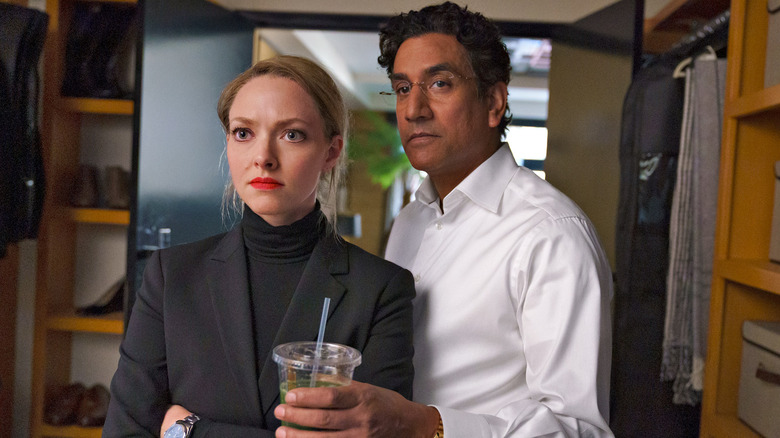The Dropout Ending Explained: The Jig Is Up
Hulu miniseries "The Dropout" has come to an end. The show served as a dramatic retelling of the rise and fall of former Theranos CEO Elizabeth Holmes (played by Amanda Seyfried) as she schemed her way to fame and fortune with imaginary medical tech and a bad Steve Jobs cosplay. The finale, "Lizzy," pivots between the events leading up to the Theranos lab shutdown and the aftermath thereof, with bits of Elizabeth's deposition spliced in. It can be a little confusing for viewers to follow, especially if they had no prior knowledge of the real-life events the miniseries is based on.
Much of the episode focuses on Holmes and her gang of grimy schemers as they make frantic attempts at damage control in the wake of the damning Wall Street Journal article by reporter John Carreyrou. The article exposed the shortcomings, lies, and mismanagement of Theranos, so of course Elizabeth and Sunny Balwani (Naveen Andrews) immediately go on the defensive and somehow manage to convince all the Theranos board members to stand by them, claiming that the article is just a bunch of falsehoods motivated by sexism and jealousy. Basically, the duo did what they do best: lie through their teeth to people rich and gullible enough to keep believing them.
Blood in the water
It seems they're in the clear until whistleblowers Tyler Schultz (Dylan Minnette) and Erika Cheung (Camryn Mi-young Kim) decide to pursue their mission to bring down Theranos even further, unsatisfied with the way Elizabeth Holmes and Theranos are still going strong despite the Wall Street Journal article. Erika decides it's time to enlist the help of a significantly less sensational, far less glamorous entity than a major publication: a government agency — specifically, the Centers of Medicare & Medicaid Services, referred to as CMS. The organization is required to investigate any complaints, and unlike private investors or media coverage, it can't be bought, sold, or swayed by charming lies and dollar signs.
This results in the main Theranos lab being shut down. Further attempts at damage control include Elizabeth breaking up with Sunny and attempting to rewrite the narrative of their relationship, as well as participating in a disastrous TV interview during which she refuses to actually apologize or acknowledge any wrongdoing.
Following that, we jump forward to how Elizabeth has reinvented herself in the wake of her company caving in on itself. She does this by getting a new, significantly younger boyfriend and essentially adopting a new persona while she awaits sentencing for the many crimes she committed on her rise to the top. She doesn't seem to care about the people she hurt along the way, and she refuses to acknowledge the weight and severity of what she's done, save for a brief, screaming breakdown. Afterward, she puts on a happy face, boards an Uber, and rides off into the next chapter of life despite the shadow of failure, deceit, and potential prison time looming over her.
So that's how the episode ended — but how does it compare to reality?
The boyfriend thing
While certain aspects of the Theranos saga didn't happen exactly as they were depicted in "The Dropout," the finale — and the miniseries as a whole — does a pretty solid job of capturing the key elements and events of the actual story. For instance, Elizabeth Holmes really did get involved with a guy eight years younger than her following her breakup with Sunny and the crumbling of Theranos. Specifically, he's Billy Evans, heir to the Evans Hotel group. If that means nothing to you, suffice it to say the guy is extremely wealthy because he comes from an extremely wealthy family. As the facts given at the end of the show reveal, the couple did attend Burning Man in 2018. They're now married with a young son, and Elizabeth is currently still enjoying her freedom and new life as she awaits sentencing.
It's also true that she faces up to 20 years in prison for her crimes, charges of nine counts of wire fraud and two counts of conspiracy to commit wire fraud.
Did Elizabeth really 'turn' on Sunny?
During her trial, Elizabeth Holmes alleged that Sunny Balwani was a manipulative and abusive mastermind who pushed her into becoming the black turtleneck-wearing, green juice-chugging scammer she turned out to be. In the show, this plays out during a conversation when Elizabeth begins to spin the narrative of her relationship with Sunny, placing emphasis on their age difference. Astonished, Sunny replies, "Oh, you're good," implying that he sees this as a calculating move on Elizabeth's end.
Far be it for me to call into question another woman's accounts of abuse, but there's something to be said for her very public track record of inability to accept accountability. For instance, the fictionalized version of the "Today" show interview featured in the finale includes direct quotes and material from the actual interview, including her use of the word "devastating" and her assertion that the numerous inaccurate test results produced in her Theranos labs did not put anyone's health at risk.
Ultimately, "The Dropout" miniseries finale seemed to capture the essence of the ongoing Elizabeth Holmes saga without overstepping bounds or choosing sides. In the words of series creator Elizabeth Meriwether: "The point of the series for me was to raise questions, not to answer them." Mission accomplished.



